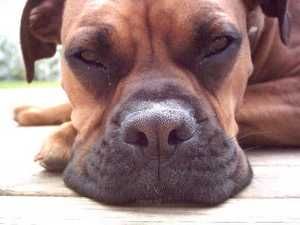About Boxers
 Intelligent, playful, clownish, loyal family member: the boxer is truly the all-in-one dog. The boxer has been a guardian, a herder, a pet, a show dog and so much more. They are arguably the most versatile dog in the canine world. The boxer's sense of humor and love of life make him a fun partner and companion. He has a strong desire for human affection and must be a home dog. His nature is to protect his family and his home. However, the boxer may not be right for everyone. A downside for some people may be its high energy level. Therefore, the boxer requires lots of attention. If he is not properly exercised and challenged, the boxer may become destructive and chew everything he finds interesting. A great way to stimulate dogs is through scentwork exercises or some easy-going obedience exercises. Above all, have fun with your dog, take it easy, and show him the way through positive education and training. Games are also an excellent stimulant for boxers! The boxer can do well in an apartment as long as he gets daily walks and some park playtime or the equivalent.
Intelligent, playful, clownish, loyal family member: the boxer is truly the all-in-one dog. The boxer has been a guardian, a herder, a pet, a show dog and so much more. They are arguably the most versatile dog in the canine world. The boxer's sense of humor and love of life make him a fun partner and companion. He has a strong desire for human affection and must be a home dog. His nature is to protect his family and his home. However, the boxer may not be right for everyone. A downside for some people may be its high energy level. Therefore, the boxer requires lots of attention. If he is not properly exercised and challenged, the boxer may become destructive and chew everything he finds interesting. A great way to stimulate dogs is through scentwork exercises or some easy-going obedience exercises. Above all, have fun with your dog, take it easy, and show him the way through positive education and training. Games are also an excellent stimulant for boxers! The boxer can do well in an apartment as long as he gets daily walks and some park playtime or the equivalent.Some boxers have a strong prey-drive and may not get along with cats easily. The best way to encourage friendly relations or at least tolerable companionship, is by introducing and teaching through positive association when the boxer is a young puppy. Some boxers may not get along with other dogs of the same sex.
 The boxer is well-muscled in appearance with a close-fitting coat which comes in brindle or fawn (there are various shades of this)and also white. Some boxers have white markings on their bodies and some boxers are born all white. Their short coats do shed and a twice weekly brushing with a curry comb is highly recommended to reduce shedding and keep the coat in good condition. An occasional rub-down with a chamois cloth also helps keep the coat healthy and shiny.
The boxer is well-muscled in appearance with a close-fitting coat which comes in brindle or fawn (there are various shades of this)and also white. Some boxers have white markings on their bodies and some boxers are born all white. Their short coats do shed and a twice weekly brushing with a curry comb is highly recommended to reduce shedding and keep the coat in good condition. An occasional rub-down with a chamois cloth also helps keep the coat healthy and shiny. Like all short-muzzled breeds, the boxer is at risk in very hot or very cold weather and should never be left in a car under such conditions. Unfortunately, like many medium to large breeds, the boxer may suffer from bloat, hip dysplasia, aortic stenosis (heart ailment), hypothyroidism, and cancerous and benign tumors. If you are buying from a reputable breeder, please ask for standard health tests of the boxer breed.
Origins of the boxers date back to feudal Germany. It is believed that the now extinct Brabanter Bullenbeiser contributed the most to the genetic foundation of today's boxer. Crossed with breeds like the Bulldog, the Deutche Dogge and Great Dane, and selective breeding to a smaller sized dog eventually gave us the boxer type we enjoy today.

